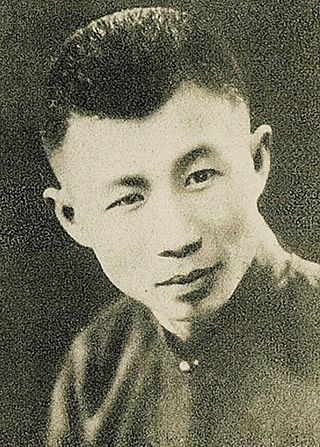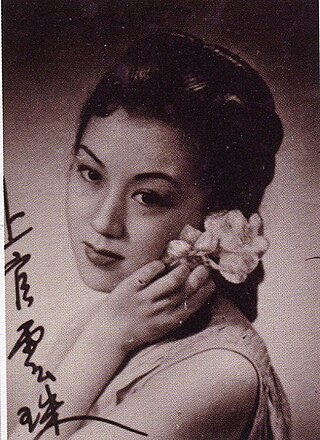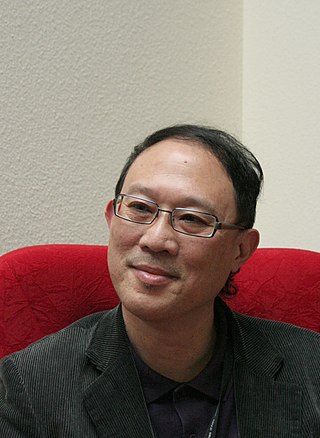
Cai Chusheng was a Chinese film director of the pre-Communist era, and was the first Chinese director to win an international film award at the Moscow International Film Festival. Best known for his progressive output in the 1930s, Cai Chusheng was later severely persecuted and died during the Cultural Revolution. His ashes are kept at the Babaoshan Revolutionary Cemetery in Beijing.

Runje Shaw (1896–1975), also known as Shao Zuiweng and Shao Renjie, was a Chinese film entrepreneur, producer and director. The eldest of the Shaw brothers, in 1925 he founded Tianyi Film Company in Shanghai, which became one of the top three film production companies in pre-WWII Republic of China, and the beginning of the Shaw Brothers media empire.

Zhang Jianya is a Chinese film director. As a graduate of the 1982 class of the Beijing Film Academy, Zhang is a founding member of the so-called Fifth Generation, a group that also includes in its numbers directors such as Zhang Yimou, Chen Kaige, and Tian Zhuangzhuang.
He Qun was a Chinese filmmaker. A graduate of the 1982 class of the Beijing Film Academy, he was an inaugural member of China's "Fifth Generation" movement.

Zheng Zhengqiu was a Chinese filmmaker often considered a "founding father" of Chinese cinema.
Cheng Bugao was a prominent Chinese film director during the 1930s. Employed by the Mingxing Film Company, Cheng was responsible for several important "leftist" films in the period, including the Wild Torrents (1933) and Spring Silkworms (1933). Both films were based on screenplays by Xia Yan.
Shui Hua, born Zhang Yufan, was a Chinese film director who gained prominence in the 1950s in the early years of the People's Republic of China.

Shi Dongshan, born Shi Kuangshao, was one of the most prominent film directors and screenwriters in pre-Communist China, together with Chen Liting, Cai Chusheng, and Zheng Junli. His most notable film was Eight Thousand Li of Cloud and Moon, released in 1947. He served in the Communist government after 1949, but was later persecuted and committed suicide in 1955.
Lai Pak-hoi or Li Beihai (1889–1950) was a Chinese actor and producer based in Hong Kong, and an early pioneer of the Hong Kong film industry.

Shangguan Yunzhu was a Chinese actress active from the 1940s to the 1960s. She was considered one of the most talented and versatile actresses in China, and was named one of the 100 best actors of the 100 years of Chinese cinema in 2005.

Tianyi Film Company, also called Unique Film Productions, was one of the "big three" film production companies in pre-Second World War Republic of China. Founded in Shanghai in 1925 by the Shaw (Shao) brothers led by Runje Shaw, the company also established operations in Malaya and Hong Kong. Although the company's Shanghai studio was destroyed in 1937 during the Japanese invasion, its offshoot in Hong Kong, later called Shaw Brothers Studio, blossomed into a media empire under the leadership of the youngest brother, Sir Run Run Shaw.

Wan Jen is a Taiwanese filmmaker. He is a member of Taiwan's New Wave cinema movement of the 1980s.

Yan Ruisheng is a 1921 Chinese silent film directed by Ren Pengnian and starring Chen Shouzi and Wang Caiyun. A docudrama based on the murder of Wang Lianying the previous year, it follows a young man named Yan Ruisheng who, deeply in debt, kills a courtesan to steal her jewellery. The crime is discovered, and he and his accomplices attempt to flee. Yan is captured in Xuzhou and returned to Shanghai, where he is executed.

Zhou Jianyun was a Chinese dramatist and film entrepreneur. Born in Hefei, Anhui, he travelled to Shanghai in his youth for school before entering the city's drama community through the Qimin New Drama Society and press through the Emancipation Pictorial. With his fellow dramatists Zhang Shichuan and Zheng Zhengqiu, in 1922 he established the Mingxing Film Company, variously serving as its manager, finance director, and film distributor. He spearheaded the establishment of the Liuhe Film Distribution Company in 1928, and in the early 1930s he hired several Communist screenwriters. Mingxing was closed in 1939 during the Second Sino-Japanese War, and although Zhou established several further companies, these were short-lived.

Orphan Rescues Grandfather is a 1923 Chinese silent film directed by Zhang Shichuan for the Mingxing Film Company. Starring Wang Hanlun, Zheng Zhegu, and Zheng Xiaoqiu, this melodrama follows the pregnant widow of a wealthy man who, after her reputation is tarnished, is evicted from her husband's family. Ten years later, her son becomes an apt pupil who saves his grandfather from a plot to steal his wealth.

Sing-Song Girl Red Peony is a 1931 film directed by Zhang Shichuan for the Mingxing Film Company. It follows the actress Red Peony, played by Hu Die, who is trapped in an abusive marriage but feels obligated to persevere. The first sound film made in the Republic of China, production took six months and involved an expansive crew, including language coaches, to surmount the technical difficulties. The film, now thought lost, was well received by audiences.

Zhang Xinsheng, also known as Retribution is a lost 1923 crime film from the Republic of China. Directed by Zhang Shichuan, it was adapted by Zheng Zhengqiu from a real-life patricide in which a deeply indebted man had killed his father for his inheritance. Emphasizing verisimilitude in its production and advertising, Zhang Xinsheng was initially a modest success but was later censored for its graphic violence.

The Mingxing Film Company, also credited as the Star Motion Picture Production Company, was a production company active in the Republic of China between 1922 and 1937. Established by a consortium of creative professionals, including film director Zhang Shichuan, dramatist Zheng Zhengqiu, and critic Zhou Jianyun, Mingxing initially produced comedy films that drew little audience attention. Facing insolvency, in 1923 the company used its last capital to produce Orphan Rescues Grandfather, which released to massive commercial success and provided the company with the revenue needed to expand and hire new talent.
Fate in Tears and Laughter is a 1932 Chinese romantic drama directed by Zhang Shichuan for the Mingxing Film Company. Based on Zhang Henshui's novel of the same name, it follows a young student who falls in love with a singer, even as another woman vies for his attention and a relative attempts to arrange him with a third. Filmed in Beijing over the course of two months, Fate in Tears and Laughter was subjected to a copyright lawsuit after its première that delayed screening for three months.














